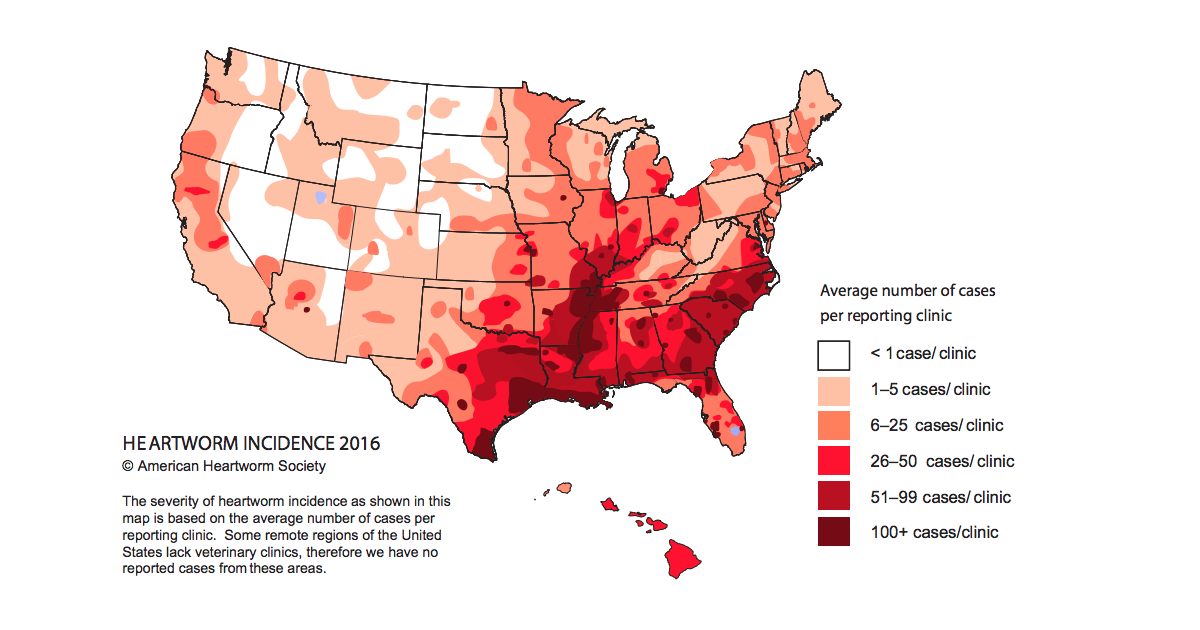- Not a substitute for professional veterinary help.
You’ve probably heard about heartworm and that it has the potential to be fatal, but as a dog owner, you might be still wondering how your dog might get heartworm?
This article gives you all of the information you need to know to protect your dog from heartworm disease, and answers the question, “how do dogs get heartworm?”
What Are Dog Heartworms?
Heartworms are a long slender parasite, called Dirofilaria immitis, that live in the pulmonary artery and heart of dogs and cats.
These worms can reproduce, become over a foot-long, and over 250 worms can be found in one dog. Heartworms damage the lungs and heart by blocking the pulmonary artery, restricting blood flow in the heart, which in turn causes heart failure.
Heartworm larvae can be transmitted by mosquitoes from an infected dog to yours through a mosquito bite. Thankfully, Heartworm Disease is preventable and treatable.

https://www.heartwormsociety.org/
Heartworm Symptoms in Dogs
Heartworm Disease is often asymptomatic, meaning there are no early signs. However, when signs are seen once the disease has advanced, they include the following:
- Weight loss
- Difficulty breathing
- Diminished exercise tolerance/Lethargy
- Distended abdomen from fluid accumulation
- Fainting due to the lack of circulating oxygenated blood
- Coughing
Heartworm Transmission and Lifecycle
It takes only one bite from one mosquito carrying the heartworm larvae to infect your dog.
This mosquito may have fed from another dog or wild animal that had heartworm larvae originally. The larvae the mosquito was carrying then develops into an adult worm in your dog after traveling through the circulatory system and settling in the pulmonary vessels and the heart.

http://www.animalhospitalofwilkes.com/about-us/services/heartworm.html
Testing for heartworm is recommended for all dogs over 7 months of age every 12 months throughout their life.
This is because if they do test positive, the heartworms will be caught early enough to initiate treatment. The test involves just taking one drop of blood and your vet will have the results in only 10 minutes.
Heartworm Prevalence
While heartworm has been diagnosed in all 50 states, it is most common in the South and Southeast of the United States (see map below).

https://www.heartwormsociety.org/
There are hotbeds of the disease in other locations around the United States due to dogs that are relocated from high incidence areas or in areas of standing water and warm urban centers. Heartworm can also be seasonal, with rainfall and hot weather creating a breeding ground for mosquitoes.
The incidence rate and location can be a reason for many owners to decide with their veterinarian if they should treat their dog for heartworm. That said, the American Heartworm Society recommends all dogs be administered a year-round heartworm preventive approved by the FDA.
These are listed in the Heartworm Prevention section below.
Heartworm Prevention
Heartworm preventive medications are all in the class of the Macrocyclic Lactones, which are FDA approved for heartworm prevention in your dog.
These drugs are some of the safest used in veterinary medicine and include:
- Heartgard Plus® (Ivermectin)
- Trifexis® (Milbemycin Oxime)
- Revolution® (Selamectin)
- Advantage Multi® (Moxidectin)
These are usually given as an oral pill or topical application once-a-month, year-round, starting as early as 4 months of age.
A preventive medication should always be given under veterinary direction with a blood test every 12 months to confirm that your dog isn’t infected with heartworms.
This disease has the advantage that the prevention medication is part of the treatment. However, using the preventative medications alone will not be enough to treat heartworm and may prolong the disease leading to serious or fatal complications.
There may be recommendations out there that say not to put your dog on preventative if it doesn’t live in an endemic heartworm area.
Following this type of advice could be risky and could lead to a lack of protection for your dog if they do get infected. In many cases, it’s better to be safe than sorry.
Heartworm Treatment for Dogs
While heartworm is treatable, the treatment warrants hospitalization of your pet with blood work, X-rays, and injections.
The only drug approved by the Food and Drug Administration (FDA) for treatment of this disease is Melarsomine which is administered by injection at a veterinary hospital. Antibiotics will also be given to help kill a bacteria that likes to hitch a ride with this parasite.
Cage rest and decreased exercise will be recommended for a few months to prevent any complications. Treatment is time intensive but has the best chance of cure if the disease is caught early.
Your dog can get infected with heartworms with just one mosquito bite but with prevention onboard, you won’t have to worry about this parasite causing any problems for your furry friend.



